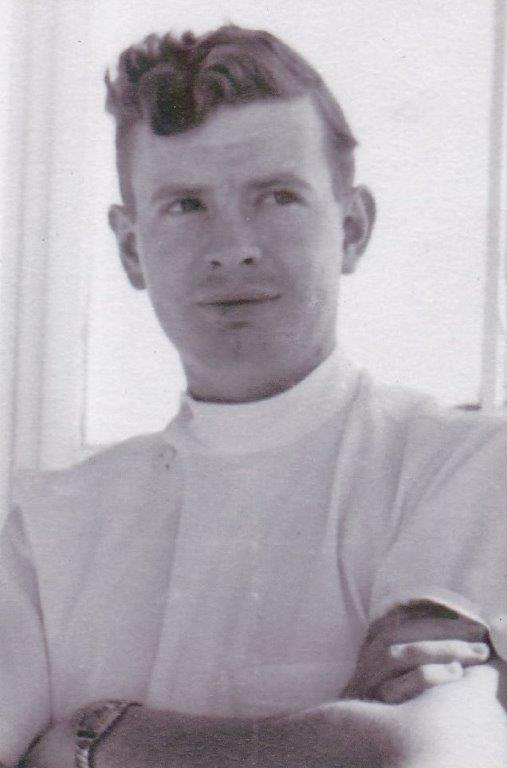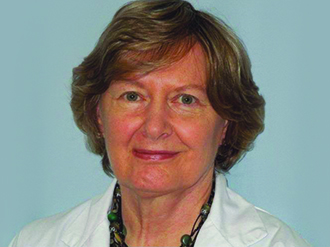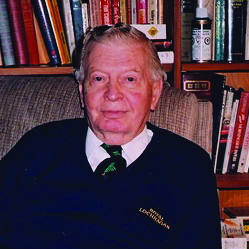Fall 2017 (Volume 27, Number 3)
From Horse's Hoofbeats...to Zebras: Dad, the Rheumatologist
By Catharine Dewar, PhD, MD, FRCPC
Download PDF
David Lloyd George Howard died in 2015.1 Dad involved me in his career from an early age. On house calls, I’d usually wait in the car unless the visit was a long one. On my wall is a gift to Dad from a patient with severe rheumatoid arthritis (RA). It is a fine watercolour of Bow Falls, which I treasure. Waiting for Dad to finish hospital rounds, I’d play with the leather medicine balls in “the gym.” Sitting on Dad’s exam table, I’d peer down at the Calgary Stampede Parade. My siblings and I were the envy of our school chums. Having a “Dr. Dad” was one thing, but one with a high-office view of the annual parade? Unimaginable.
Dad asked questions as we walked: “What do you notice about that man, Catharine? Do you see how he walks?” Thus, he introduced the Trendelenburg gait. “See that man turning his whole body?” That was my first lecture on ankylosing spondylitis. “Do you see the woman with blue lips, who seems to be whistling?” That was a lesson on pursed-lip breathing and chronic lung disease. Like many pioneer rheumatologists in Canada, Dad practiced internal medicine and rheumatology for most of his career. Dad completed his rheumatology training at the Mayo Clinic in the early 1950s. He recalled one mentor berating him for missing clonus... at one patella! Dad recalled a boy baffling many MDs with his “spells.” A visiting specialist came and, on cue, the boy had a spell. The doctor promptly slapped the boy and said, “Enough of that behaviour. This nonsense ends NOW!” The spells ended and all the MDs were in awe. Not of the slap (!) but the perspicacity of this esteemed specialist. So many stories come to mind when I’m with my patients using Dad’s reflex hammer or stethoscope.
Dad was born in Harris to Saskatchewan homesteaders. His father had asked him, “Why do you want to make money off sick people?” His father decided his two older brothers would work the farm. As a result, Dad found his mentor in the village general practitioner (GP). From the University of Saskatchewan, Dad went to Toronto to obtain his MD, and to McGill University for research training with Dr. Hans Selye.2 With sage advice from Edward Dunlop3 and a Canadian Arthritis and Rheumatism Society (CARS) scholarship, he left Canada to study with Dr. Philip Hench4 at the Mayo Clinic. Canada wouldn’t offer this training for decades.
Remarkable events for a boy who had to leave the farm, which he loved. I am blessed Dad lived to 93. It meant I had years of tutelage. It meant he was there to see me awarded Clinician Teacher of the Year in 2000, as an academic rheumatologist at his alma mater, U of T. A final bond came when my mother developed severe RA at age 66.5 She died just before the “biologic era” therapies which astounded Dad. Throughout my career I’ve been indebted to my first mentor, my Dad, the rheumatologist.
References:
1. Dr. David “Red” Howard MD (January 18, 1922 – August 19, 2015). Available at http://www.legacy.com/obituaries/timescolonist/obituary.aspx?pid=175739581. Accessed on September 12, 2017.
2. Hans Selye. Avalable at https://en.wikipedia.org/wiki/Hans_Selye. Accessed on September 12, 2017.
3. Edward Arunah Dunlop Jr. Available at https://en.wikipedia.org/wiki/Edward Arunah_Dunlop,_Jr. Accessed on September 12, 2017.
4. Lloyd M. Philip Showalter Hench 1896-1965. Rheumatology 2002; 41:582-4.
5. Reflections on Rheumatoid Hands. Available at http://www.craj.ca/ archives/2016/English/Spring/Dewar.html. Accessed on September 12, 2017.
Catharine Dewar, PhD, MD, FRCPC
Head,
Division of Rheumatology
Lions Gate Hospital
North Vancouver, British Columbia

Dr. Red Howard in1948.

Dr. Catharine Dewar

Dr Red Howard at age 82.
|
